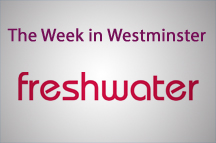 As political and economic leaders unite for their annual sojourn to the Alpine climes of Davos, in Westminster, Carillion, cold-calling and the proposed Sky-Fox merger put into sharp relief concerns over the relationship between corporations and the public.
As political and economic leaders unite for their annual sojourn to the Alpine climes of Davos, in Westminster, Carillion, cold-calling and the proposed Sky-Fox merger put into sharp relief concerns over the relationship between corporations and the public.
Carillon
The liquidation of Carillon and subsequent imperilment of thousands of employees, small suppliers, and 27,000 pension scheme members continues to focus minds. This week it has been on the lips of MPs in parliamentary business spanning skills, prisons, health and social care, schools, executive pay, corporate taxation, private sector pensions, rail and libraries.
On Monday, the fresh-in-post Cabinet Office minister, David Lidington, detailed to the House the government’s hard work to protect the interests of those worst hit. This flurry of activity after-the-fact will not mitigate Labour’s criticism that ministers failed to monitor Carillion, despite three profit warnings over five months in 2017 and a near-total collapse in its share price.
Labour’s offensive was spearheaded on Wednesday by Jon Trickett who, in partisan style, painted Carillion as a microcosm of the failures of public sector outsourcing. His opening address may become a milestone moment in political culture: the first time that Hansard’s august pages were blemished by the colourful acronym, “WTF”. Responding, David Lidington argued that Mr Trickett had “disavowed his party’s entire history of 13 years in government” by failing to acknowledge the outsourcing and use of PFI contracts under Blair and Brown.
Financial Guidance and Claims Bill
The Financial Guidance and Claims Bill had its second Commons reading on Monday. At its introduction in the Lords last summer, the bill was framed by Baroness Buscombe as “deliberately small”, but it has provoked debate on a breadth of concerns. Most parliamentarians seem to agree that cold-calling is, at best, a nuisance and, at worst, bullying, intimidating and exploitative. This explains the opposition’s successful amendment to enable a full ban on pensions cold-calling.
The bill is, in part, a recognition of the way that Claims Management Companies (CMCs), so often responsible for cold-calling malpractice, avoid effective regulation. Fears are that uncertainty over Carillion’s pension scheme will fuel unscrupulous and opportunistic pension advisers, who loiter in between the cracks of the regulatory framework, to target its members.
Forthcoming debates are likely to include whether cold-calling should be stopped, or otherwise limited, in markets beyond pensions, and consideration of whether CMCs should be banned altogether. This should be uncontroversial. But the looming spectre of Carillion will provide more fodder for a wider debate invoking grand political concepts: corporations and individuals; freedoms and protections; big and small state.
Sky and 21st Century Fox merger
There are few issues more likely to rouse MPs’ emotions than the proposed merger of Sky and 21st Century Fox. It is unsurprising that the Competition and Markets Authority’s (CMA) provisional finding, that the deal would not be in the public interest on the grounds of plurality, warranted an oral statement from the new culture secretary. Matt Hancock will soon have to make his first big decision in the job. For now, he is not giving anything away. Tightly framing his statement to parliament on Tuesday, he deflected attempts from Ed Miliband and Tom Watson to draw him into discussing “standing up to the Murdochs” and expediting the Leveson 2 inquiry.
For many, the proposed Sky-Fox deal throws up the same kind of visceral concerns provoked by Carillion and cold-calling: how, and for whom, big business and markets are regulated and how the government should respond to the fortunes of the winners and the losers.
In this climate, the message delivered by the then new Prime Minister May 18 months ago provides fodder for all parties: “When we take the big calls, we’ll think not of the powerful, but you”.














